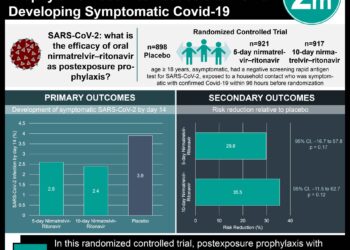#VisualAbstract: Renin–Angiotensin–Aldosterone System Blockers and the Risk of Covid-19
1. Angiotensin-converting-enzyme (ACE) inhibitors and angiotensin-receptor blockers (ARBs) were not shown to affect the risk of coronavirus disease 2019 (Covid-19).
2. ACE inhibitors and ARBs were shown to be more frequently used among Covid-19 patients.
Evidence Rating Level: 3 (Average)
Study Rundown: Angiotensin-converting enzyme 2 (ACE2), a membrane bound aminopeptidase abundantly expressed in the lungs and heart, is used by coronaviruses for entrance into the cell. ACE inhibitors and ARBs increase ACE2 expression and block the renin-angiotensin-aldosterone system (RAAS). Therefore, there has been concern that using these drug therapies can alter infection susceptibility. As such, the study evaluated the association between RAAS blockers and the risk of Covid-19. The study collected patient data from resident in Lombardy, Italy capturing Covid-19 infection status, underlying cardiovascular disease, and cardiovascular medication use. No evidence was found to support the use of ACE inhibitors or ARBs to be independently associated with the risk of Covid-19. This retrospective study was limited by drug use data was assessed through prescriptions. As such, actual drug consumption could not be assessed. Another limitation was the doses studied were those available in Italy, which may not reflect the doses present in other countries. Nonetheless, this study was strengthened by conducting a case-control trial to understand the relationship between underlying RAAS blocker drug use and Covid-19 risk. For physicians, these findings highlight the importance of continuing patients on their RAAS blockers to maintain cardiovascular health as these medications likely do not alter Covid-19 risk.
Click to read the study in NEJM
©2020 2 Minute Medicine, Inc. All rights reserved. No works may be reproduced without expressed written consent from 2 Minute Medicine, Inc. Inquire about licensing here. No article should be construed as medical advice and is not intended as such by the authors or by 2 Minute Medicine, Inc.







